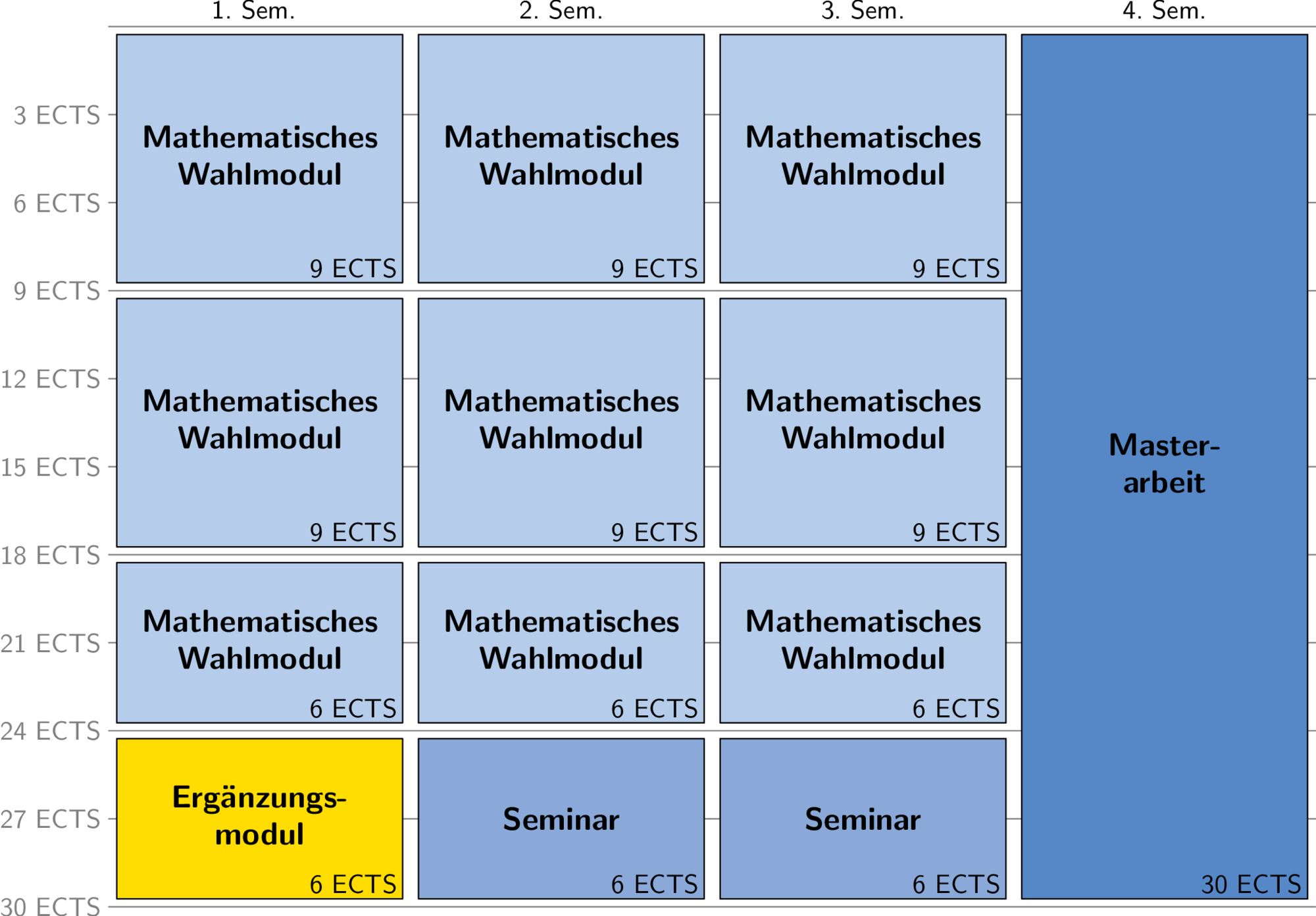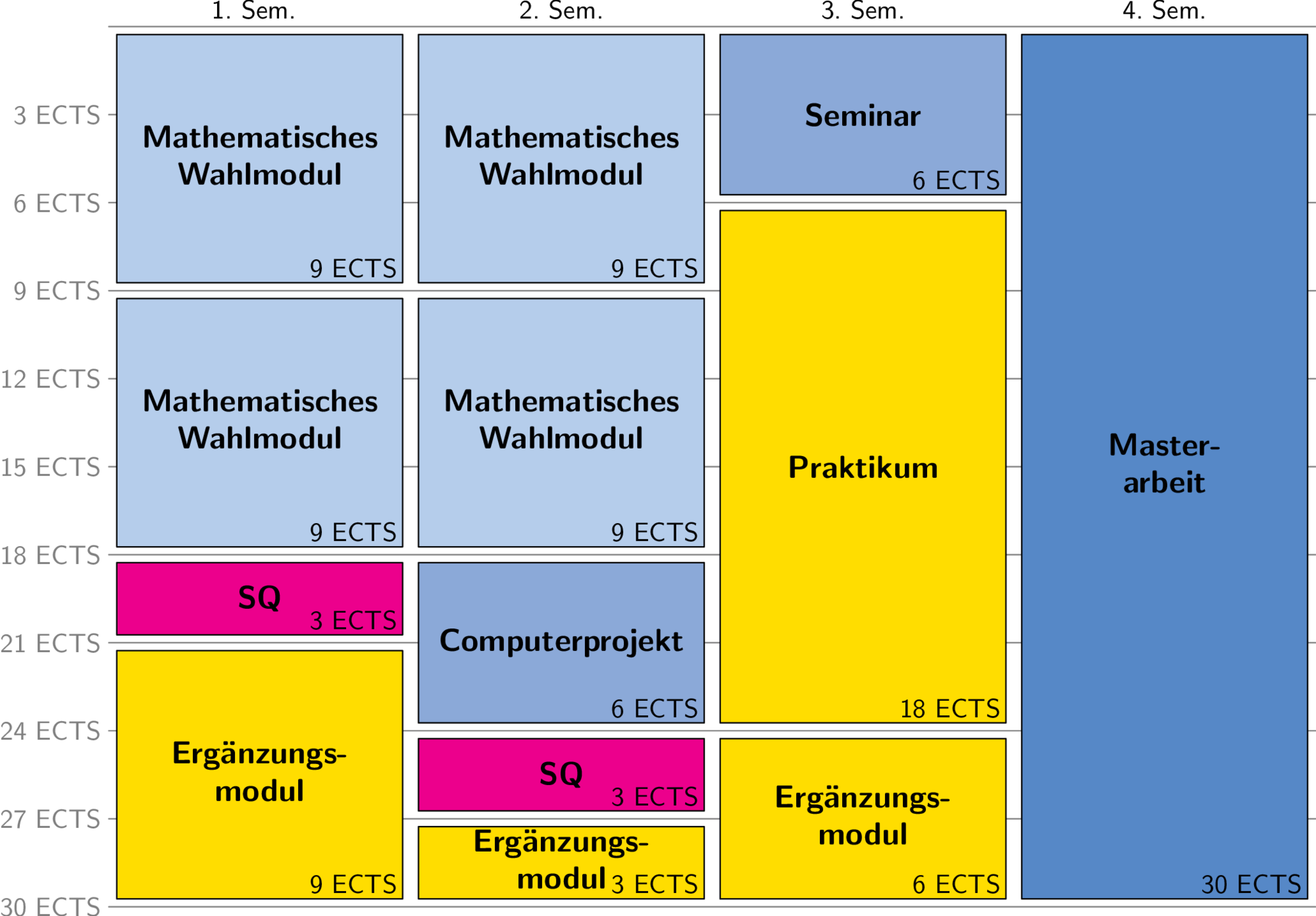Building on the Bachelor of Science in Mathematics, or an equivalent degree program, the Master of Science is a further degree in academic studies offering a professional qualification. The master’s examination determines whether the student has acquired the ability, beyond the bachelor’s degree, to work independently on mathematical problems. For this purpose, the master’s program offers a specialization in mathematics culminating in a master’s thesis. The standard period of studies is four semesters and includes the acquisition of a total of 120 credit points. (ECTS credits).
Since winter 2019/20 there is a new version of the regulations for the Master's degree program. Information about this new version can be found here on this page.
Important:
- Mailinglist Mathematics-BSc / MSc
Be sure to sign up!
Mathematical Electives
 |
From the range of elective modules mathematics 36-72 ECTS are to be chosen. The offer of the next semesters can be found on the listing of courses. |
Scientific Methods
 |
12 ECTS scientific methods, at least 6 ECTS from a seminar. The additional 6 ECTS can be earned through another seminar, a computer project, a research project or work with mathematical literature. The seminars are always presented at the end of the previous semester. Afterwards you will find the presentations in lias. |
Applied modules
 |
In the area of applied modules, 6-36 ECTS are to be earned. Up to 27 ECTS can be chosen from the Master's complementary modules, up to 6 ECTS from the applied projects and up to 18 ECTS as a non-university internship [DE]. |
Key Qualifications
 |
Up to 6 ECTS interdisciplinary key qualifications from the central offer of the university. |
Modules from the Bachelor
Up to 24 ECTS can be chosen from the elective core modules and complementary modules of the B.Sc. program. Modules from the elective core area are considered under elective modules mathematics, supplementary modules in the area of applied modules.
Detailed information about the study program
- Examination regulations 2019 [DE]
- Module guide on C@MPUS: daily updated information about the modules you can take in the elective area, you will find module descriptions and lecture times, because not every module is actually offered regularly.
- Information Exam Organization
- Planned courses
Admissions are made for both the winter and summer semesters. The usual deadlines must be observed:
- Applications for admission to the winter semester must be received in full by the University by the preceding July 15.
- Applications for admission to the summer semester must be received in full by the University by the preceding January 15.
You can apply via C@MPUS.
Applications with at least 120 ECTS in the BSc program Mathematics at the University of Stuttgart and a grade point average of 2.6 or better are automatically admitted. For all other applications, the professional aptitude of the candidate will be determined, among other things, in an aptitude interview of 30-40 minutes with the admission committee. The topics of discussion are the previous mathematics studies (incl. BSc thesis), the plans for the Master's program as well as (randomly) the basics of mathematics from analysis and linear algebra.
The basis for admission to the Master Mathematics program are the admission regulations [DE]
 |
| Mathematics-oriented course of study |
 |
| Application-oriented course of studies |
A non-university internship e.g. in a company (business, industry) or a public authority can be credited with up to 18 ECTS in the M.Sc. in the area of application modules. The internship must be approved in advance by the examination board chairperson.
On internship [DE] you will find answers to your questions: Who do I contact if I want to have an internship credited in the Master? What do I have to do for this? Which internships are possible? Where can I find job postings? and much more.
General
The master's thesis should demonstrate that the master's candidate is able to independently work on a problem from the field of mathematics using scientific methods within a given period of time and to present the results appropriately and in writing in an appropriate form.
Scope
The thesis has a scope of 30 ECTS, which corresponds to 900 hours. The processing period for the master's thesis is 6 months. The topic of the master's thesis can be assigned at the earliest when at least 60 ECTS have been acquired. The Master's thesis is usually written in German, but can also be accepted in another language upon request. Part of the master thesis is a presentation of approx. 45 minutes duration.
Assignment of a topic
It is recommended to look for a supervisor for the master's thesis at the beginning of the studies and to attend in-depth lectures and seminars with this supervisor in the run-up to the master's thesis. A master's thesis can then be written based on these events. Master's candidates usually contact a supervisor directly at an early stage if they wish to write a Master's thesis with him or her.
Examiners
The examiners are appointed by the examination board, see Examiners Master's Theses Mathematics [DE].
Contact
- Lecturers of mathematics
- Program manager Dr. Friederike Stoll
- Examination Committee Master Prof. Dr. Marcel Griesemer (Chairman)
- Prof. Dr. Michael Eisemann (Chairman)
- Prof. Dr. Marcel Griesemer (Deputy Chairman)
- Prof. Dr. Carsten Scherer
- Dr. Friederike Stoll
- alternating student representative in an advisory capacity
Contact

Friederike Stoll
Dr.Program Managment B.Sc./M.Sc./BA-Lehramt/M.Ed. Mathematik

Marcel Griesemer
Prof. Dr.Dean of Studies (B.Sc./M.Sc. Mathematik) / Professor - Head of Research Group of Analysis

Michael Eisermann
Prof. Dr.Head of Examination Committee Master Mathematik M.Sc.Professor - Head of Research Group Geometry and Topology




